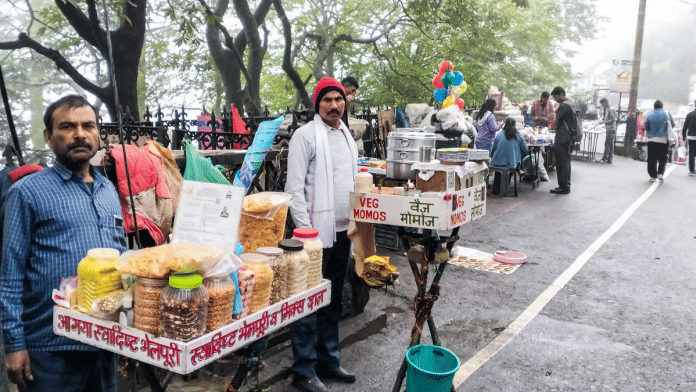Gurugram: The Punjab and Haryana High Court has dismissed a plea seeking the eviction of street vendors from Chandigarh’s Manimajra locality, saying the judiciary cannot close its eyes to the fact there is an elite class that still looks down upon their own countrymen doing small business as mafias and encroachers.
“The judiciary has to rise itself above from such impressions which such elite class carries,” the bench of Justices Sanjeev Prakash Sharma and Meenakshi I. Mehta, observed.
Adding, “We are a country where a Tribal lady from a remote village can become the President of India, and a grassroots worker can rise to the highest echelons of administration.”
Highlighting inclusivity in the judiciary, the judges noted, “Even in the judiciary, we have examples of persons who worked as munshis (a clerk or clerical assistant) with lawyers and rose to become chief justices.” The plea, filed by the presidents of the Manimajra Vyapar Mandal and a residents welfare association in the locality labelled vendors as “mafia” and “encroachers”, and alleged they caused traffic hazards and hindered business.
“We cannot close our eyes to the fact that there is an elite class still following the Britishers, who looks down upon their own countrymen doing small business and treat them as if they are mafias, as stated in the present writ petition, or encroachers who cause chaos in commercial hubs,” the bench observed.
It dismissed the petition as “motivated”, and imposed a fine of Rs 50,000 on each association to be used for the welfare of street vendors.
“Gone are the days when we had British Judges sitting in Courts, looking at justice to be delivered for people who rule. We are a country, who are now having a homogenous class of Indians,” the bench said.
The plea had sought a writ of mandamus—essentially ordering officials or a public entity to fulfil their legal obligations—to remove fruit vendors, hawkers, and squatters from public paths, roads, and areas near Rana Haweli local bus stand and Manimajra Main Bazar.
Citing the Street Vendors (Protection of Livelihood and Regulation of Street Vending) Act, 2014, the bench underscored the legal protection granted to street vendors, who provide affordable goods and alleviate urban poverty.
The court referenced Supreme Court precedents, including the Gainda Ram vs MCD (2010), which recognised, among others, street vending as a fundamental right under Article 19(1)(g), subject to reasonable regulations. The judges noted that vendors in Manimajra, once a village which has now grown to become part of urban Chandigarh, have long operated in local markets, contributing towards strengthening the community’s economic fabric.
The court criticised the petitioners’ failure to implead the vendors as parties, highlighting their right to a Certificate of Vending under the 2014 Act. The primary objective of the certificate is to provide relief to street vendors across the country.
The high court also addressed the issue of the misuse of the act whereby some shopkeepers allegedly set up hawker stalls to sell their own goods. To curb this, the court directed the Chandigarh municipal corporation to establish a dedicated cell of inspectors to regulate vending and prevent fraudulent registrations.
Further, the bench advocated for social protection of vendors, recommending that fees collected by the municipal corporation be allocated to a separate budget for their welfare, including insurance and medical facilities. “The amount recovered should be used for their benefits alone,” the court ordered, urging the framing of rules to support this initiative.
The ruling also underlined India’s socioeconomic realities, noting the urban migration from villages as a driver of the growth of cities. Quoting the Pyare Lal vs New Delhi Municipal Committee (1968) case, the court acknowledged the historical role of street vending in providing livelihoods. It rejected the notion of vendors as “mafia,” emphasizing their contribution to affordable services for the masses.
Dismissing the petition, the court warned against the misuse of legal forums to destabilise vendors’ livelihoods, reinforcing its commitment to inclusive justice.
(Edited by Ajeet Tiwari)
Also Read: Street vendors face constant threat of eviction. Valid licences & law to protect them don’t help







The day some milord’s car gets stuck in traffic at Manimajra, the High Court will lose all it’s “empathy” and we would have a nrw order asking the police to remove all street vendors and hawkers.
These things totally depend on the milord’s personal experience. The law hardly plays any role in such judgements.